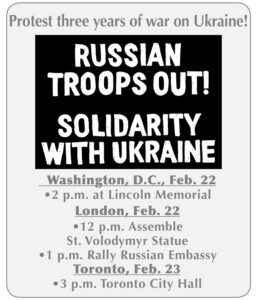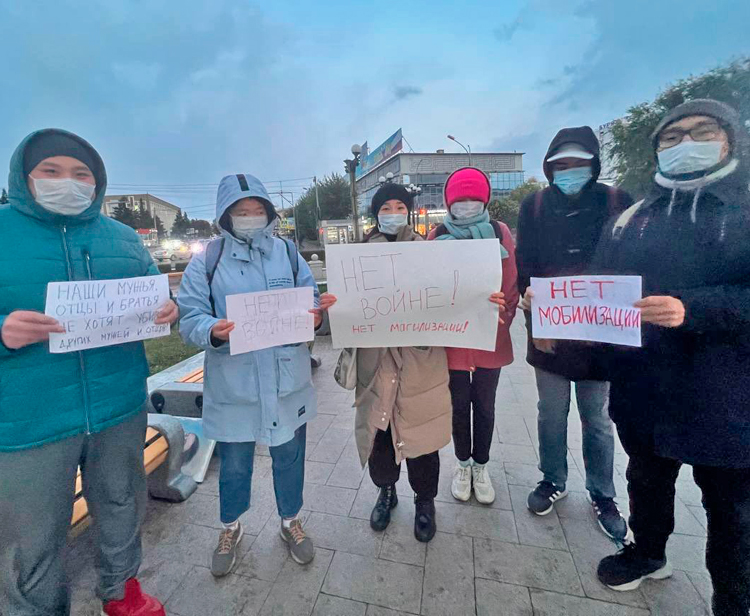Russian President Vladimir Putin is preparing a harsher crackdown targeting wider layers of organizations and individuals that oppose his regime’s war against the people of Ukraine. A special target is 172 ethnic and indigenous rights groups and media outlets branded as “terrorist.” They’re on a list released in early January by Russia’s political police agency, the Federal Security Service (FSB).
“We weren’t really surprised to find our name on the list,” Batlay Matenov, co-founder of Asians of Russia, a media outlet for Russian republics with indigenous Asian people, told the Moscow Times.
“Though it turned out that half of the organizations listed there don’t even exist in real life,” Matenov added. He laughed at the inclusion of the “Belgorod People’s Republic,” which is purely fictional.
“The Taliban are being removed from the list of terrorists, while we are being added to it,” Marina Khankhalaeva told the paper. She founded the Tusgaar Buryat-Mongolia movement and Buryat Independence Committee, which both appear on the FSB’s new list. She advocates the independence of her native republic of Buryatia in eastern Siberia using strictly nonviolent means.
Khankhalaeva said she and her supporters always knew that “opposing the Russian Empire and the Kremlin comes with consequences.”
 The indigenous people of Buryatia, which borders Mongolia, have a history of struggles against Moscow’s oppression. Ethnic Buryats, who speak a Mongolic language, comprise about one-third of the republic’s population. Like people from other poor, largely non-Russian ethnic regions in the Russian Federation, Buryats have suffered disproportionate losses from Putin’s war. A Buryat soldier was 35 times more likely to die at the front in Ukraine in 2023 than a Russian from Moscow.
The indigenous people of Buryatia, which borders Mongolia, have a history of struggles against Moscow’s oppression. Ethnic Buryats, who speak a Mongolic language, comprise about one-third of the republic’s population. Like people from other poor, largely non-Russian ethnic regions in the Russian Federation, Buryats have suffered disproportionate losses from Putin’s war. A Buryat soldier was 35 times more likely to die at the front in Ukraine in 2023 than a Russian from Moscow.
As part of leading the Russian Revolution in 1917, Bolshevik leader V.I. Lenin led the fight to remove the yoke of Great Russian domination by actively supporting the right of self-determination for all nationalities, including Buryats, who had been oppressed in the czarist prison house of nations.
With Lenin’s support, Buryats in the early 1920s established an autonomous republic and voluntarily remained part of the Union of Soviet Socialist Republics. This led to the flowering of their language and culture, as happened in Ukraine.
But these historic gains were overturned in a bloody counterrevolution led by Joseph Stalin. Working people were driven from political power and Moscow’s domination over nations recently freed from its grasp was restored.
With the implosion of the USSR in 1991, space emerged again for struggles by working people and oppressed nations. Now, Putin is using the prolonged war in Ukraine to try to close those openings.
Fight for Buryat rights today
One prominent voice from Buryatia is Viktoria Maladaeva, who joined the resistance to Moscow’s invasion of Ukraine three years ago by helping found the Free Buryatia Foundation. It provided support to Buryat conscientious objectors and others. She now heads Indigenous of Russia, which seeks to unite the country’s indigenous peoples “against Russian colonialism” and promotes their basic rights, including for their languages and historic lands.
Now living in the U.S., she advocates the right to self-determination for indigenous people in a free Buryatia. She calls for open debate and a popular decision on whether to remain in the Russian Federation or seek independence.
The Putin regime is turning back to methods used by Stalin, where entire ethnic groups were labeled “enemies of the state,” with brutal consequences. This was the case with the deliberate mass starvation of Ukrainians in the 1932-33 Holodomor. The label was also used to carry out mass deportations during World War II of hundreds of thousands of Crimean Tatars, Kalmyks, Ingushs, Chechens and other peoples, smearing them as collaborators with Nazi Germany.


